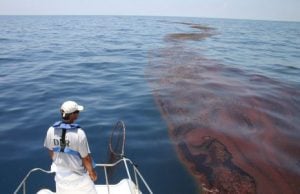Another Executive Order leads to yet another hit on the environment as North Carolina becomes a target for offshore oil drilling.
The Outer Banks of North Carolina have been free of oil drilling for nearly 30 years, but it is going to be a fight to keep the coast under protection. In late April, President Trump directed the U.S. Dept. of the Interior to review locations for offshore oil and gas exploration. The Executive Order calls for returning hundreds of miles of federal waters in the mid and south Atlantic, that just last year were marked off-limits by the previous administration, back into eligibility for drilling. Moving forward with the process, the administration announced on May 10 that it is beginning the permitting process for seismic testing in the Atlantic waters.

Photo by World Maritime News
Loud blasts of compressed air boom through the ocean’s depths from multiple seismic air gun arrays in the process of seismic testing. This technique surveys through the ocean to find oil and gas deposits deep below the ocean floor. According to the Outer Banks Sentinel, critics argue that air blasting process is harmful to marine life, while the Department of Interior counters that it should not have “significant impacts on marine mammal populations.”
Drilling deep into more remote waters such as the shores of the mid-Atlantic, increases the risk of spills which, as we learned with the BP crisis, can irreversibly damage the ocean, threaten livelihoods, and destroy habitats. Adding to the potential impact on marine life, carbon pollution to the air gets added to the mix as it is caused from the burning fossil fuels and is the leading cause of climate change and ocean acidification.
In an effort to give voice to many who oppose the seismic testing and oil drilling, the Business Alliance for Protecting the Atlantic Coast (BAPAC) headed off for Washington D.C. just after the signing of the Executive Order to deliver a strong message to representatives in Congress: offshore oil and gas drilling and exploration is bad for business. As of today, 125 East Coast municipalities, over 1,200 elected officials and an alliance representing over 41,000 businesses and 500,200 fishing families have publicly opposed seismic airgun blasting.

Photo by GA Dept. of Nat. Resources
Impacting the state economy from the beaches to the Blue Ridge, the addition of oil rigs off the coast would impact countless businesses from commercial fishing to tourism and recreation. Healthy, clean ocean ecosystems are crucial in preserving the nearly 1.4 million jobs and over $95 billion made in gross domestic product each year along the Atlantic coast.
“Clean, renewable resources of energy like offshore wind would provide far more jobs than oil drilling,” according to Oceana, an international organization focused solely on ocean advocacy.
Bringing in a more optimistic view, David McGowan, executive director of the N.C. Petroleum Council, an industry trade group, says that even under the most favorable conditions, the process – which involves hearings, studies and reviews – would take at least a decade before oil rigs pumped the first barrel.
Whether oil rigging off the coast of North Carolina were to happen tomorrow or in 10 years, it’s time to start taking action and letting your elected officials know where you stand on oil rigs becoming a reality. If you would rather not have seafood on your plate from potentially oil polluted waters and don’t wish to take part in a practice that does much more harm than good, say no to offshore drilling. Help preserve our healthy coasts for generations of the future enjoy and take pride in.








